Get the complete NECO Government Questions and Answers for 2025 SSCE here.
You are welcome to this website if you are visiting for the first time.
You are privileged to open this article today. Here, I will be reveal to you a secret that most candidates of the National Examination Council (NECO) have not had access to.
What is this secret all about? Do you wish to know? Just continue to read this post.
In this article, I will be giving you a complete Expo on NECO Government Question and Answers for 2025 June/July Senior School Certificate Examination.
If you know that you are a candidate for 2025 NECO examination, you have to do yourself a favour by reading this article carefully to the end.
Remember that this article will only benefit interested and serious students. To know more about the NECO Government Questions and Answers for 2025 June/July SSCE, ensure that you do not leave this page.
- NECO Government Questions and Answers 2025
- NECO Government Objective Questions for 2025
- NECO Government Objective Answers 2025
- NECO Government Theory Questions 2025
- NECO Government Theory Answers for 2025
- More NECO Government Objective Questions
- NECO Government Objectives Answers 2024
- More NECO Government Essay Questions
NECO Government Questions and Answers 2025
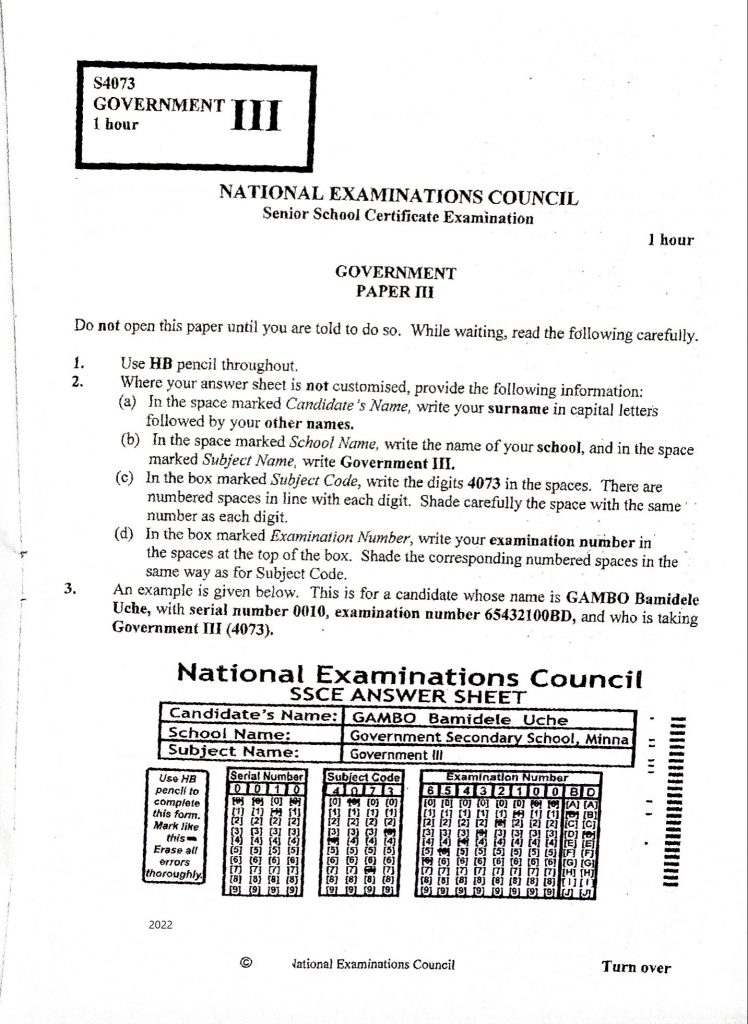
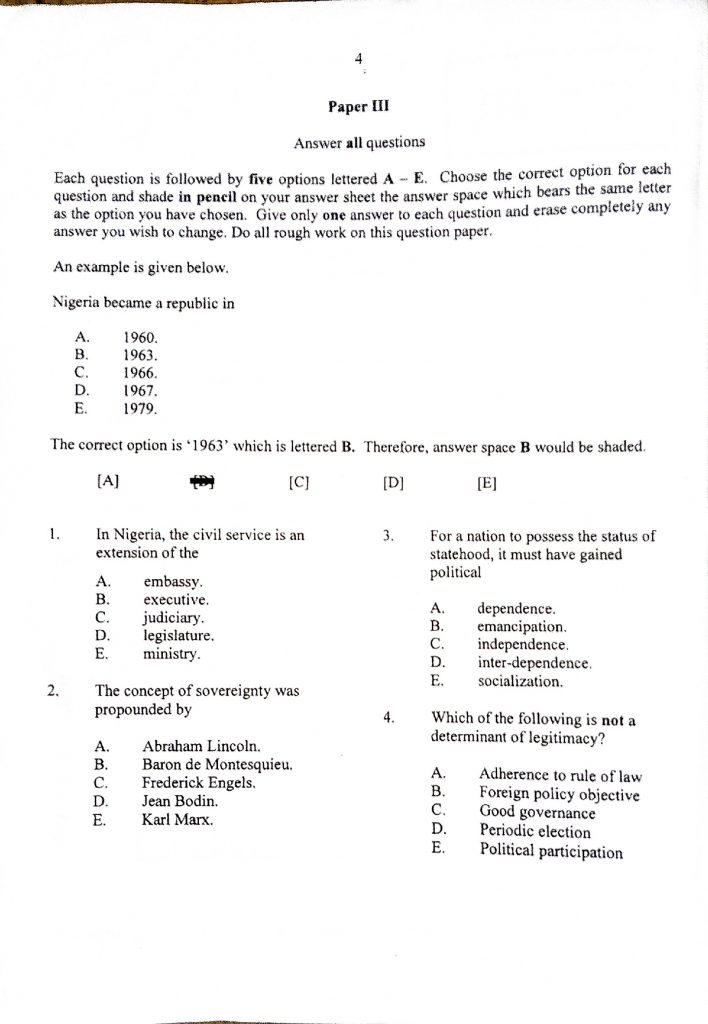
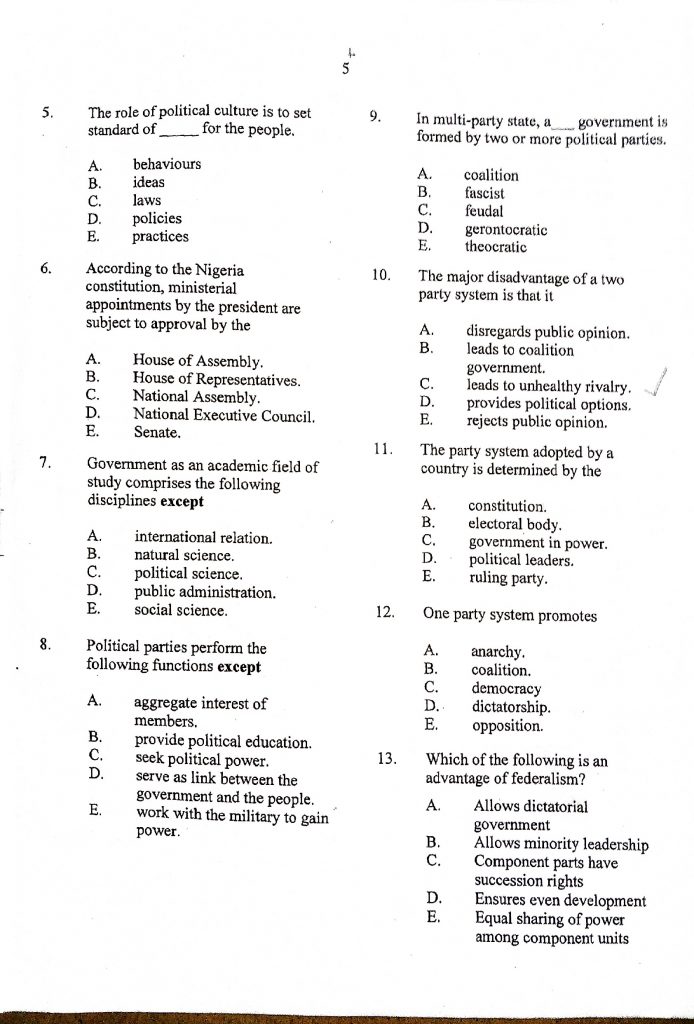
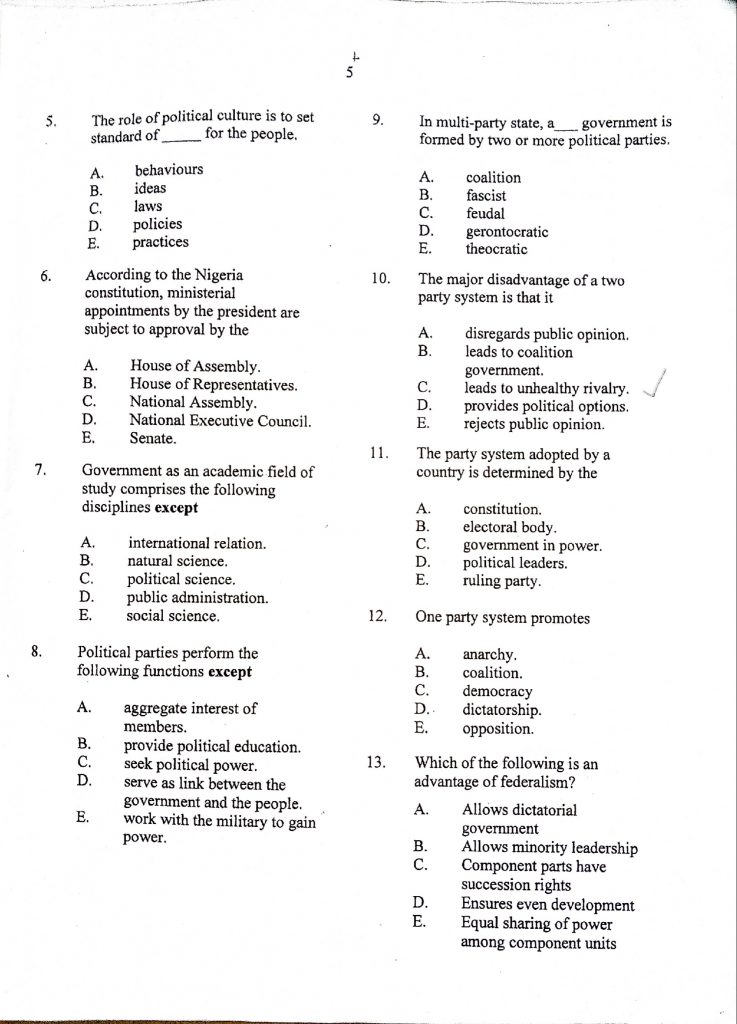
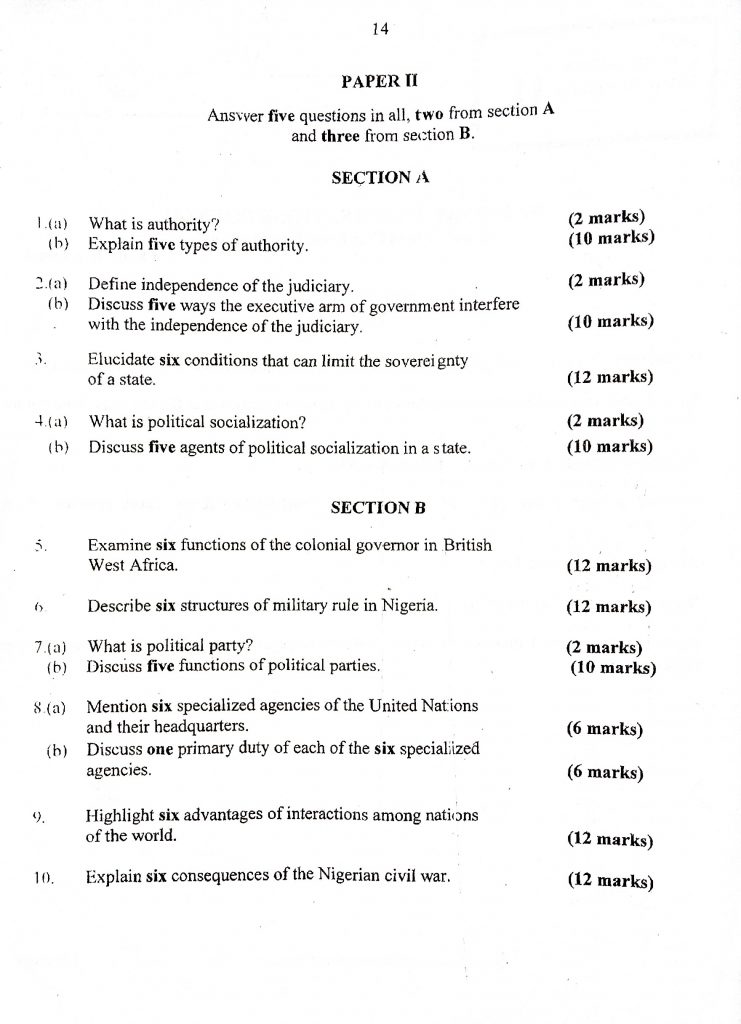
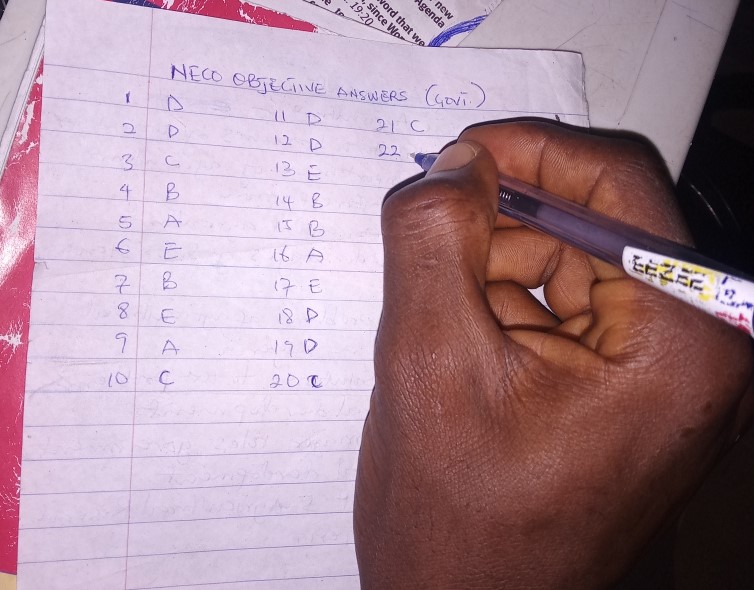
See also: The Newly Updated NECO Timetable
NECO Government Objective Questions for 2025
This section of the article contains the complete NECO government objective questions for 2025.
Paper III
Answer all questions
Each question is followed by five options lettered A – E. Choose the correct option for each question and shade in pencil on your answer sheet the answer space which bears the same letter as the option you have chosen. Give only one answer to each question and erase completely any answer you wish to change. Do all rough work on this question paper.
An example is given below,
Nigeria became a republic in
A.1960.
B. 1963.
C. 1966.
D. 1967.
E. 1979.
The correct option is ‘1963’ which is lettered B. Therefore, answer space B would be shaded.
[A] [B] [C] [D] [E]
In Nigeria, the civil service is an extension of the………………..
A.embassy.
B. executive
C. judiciary.
D. legislature.
E. ministry.
2. The concept of sovereignty was propounded by……………..
A. Abraham Lincoln.
B. Baron de Montesquieu.
C. Frederick Engels.
D. Jean Bodin.
E. Karl Marx.
3. For a nation to possess the status of statehood, it must have gained political
A. dependence.
B. emancipation.
C. independence.
D. inter-dependence.
E. socialization.
See Also: NECO Mathematics Questions And Answers For 2025 | Theories And Objectives
4. Which of the following is not a determinant of legitimacy?
A. Adherence to rule of law
B. Foreign policy objective
C. Good governance
D. Periodic election
E. Political participation
5. The role of political culture is to set standard of——-for the people.
A. behaviours
B. ideas
C. laws
D. policies
E. practices
6. According to the Nigeria constitution, ministerial appointments by the president are subject to approval by the
A. House of Assembly.
B. House of Representatives.
C. National Assembly.
D. National Executive Council.
E. Senate.
7. Government as an academic field of study comprises the following disciplines except
A. international relation.
B. natural science.
C. political science.
D. public administration.
E. social science.
8. Political parties perform the following functions except
A. aggregate interest of members.
B. provide political education.
C. seek political power.
D. serve as link between the government and the people.
E. work with the military to gain power.
9. In multi-party state, a_____ government is formed by two or more political parties.
A. coalition
B. fascist
C. feudal
D. gerontocratic
E. theocratic
10. The major disadvantage of a two party system is that it disregards public opinion.
A. leads to coalition
B. government.
C. leads to unhealthy rivalry.
D. provides political options.
E. rejects public opinion.
11. The party system adopted by a country is determined by the
A. constitution
B. electoral body.
C. government in power.
D. political leaders.
E. ruling party.
12. One party system promotes
A. anarchy.
B. coalition.
C. democracy
D. dictatorship.
E. opposition.
13. Which of the following is an advantage of federalism?
A. Allows dictatorial government
B. Allows minority leadership
C. Component parts have succession rights
D. Ensures even development
E. Equal sharing of power among component units
14. State where powers are shared between the centre and component units operates a ———–system of government.
A. confederal
B. federal
C. parliamentary
D. presidential
E. unitary
15. Adoption of————-party system is most suitable for a heterogeneous state.
A. elite
B. multi
C. one
D. two
E. zero
16. Rates are collected in Nigeria by the
A. federal government.
B. geo-political zones.
C. local government council.
D. state government.
E. traditional council.
17. Which of the following is not a function of civil service?
A. Advising the government
B. Formulation of policies
C. Implementation of policies
D. Preparation of budget
E. Provision of essential services
18. The views of the people on a given socio-political and economic issue can be measured through
A. alignment policy.
B. opinion poll.
C. pressure group.
D. public sensitization.
E. social status.
19. The governing board of a public corporation is usually headed by a—————–
A. chairman.
B. commissioner.
C. director general.
D. honourable minister.
E. permanent secretary.
20. Workers in government establishments are
A. ad-hoc staff.
B. administrators.
C. civil servants.
D. contract staff.
E. expatriates.
21. The removal of government control from public corporations is
A. commercialization.
B. deconcentration.
C. deregulation.
D. devolution.
E. privatization.
22. Public opinion enables government to
A. empower the citizenry.
B. execute its policies.
C. guarantee citizens’ freedom.
D. promote economic development.
E. protect life and property.
23. Which of the following is not a pressure group?
A. Academic Staff Union of Universities
B. All Farmers Association of Nigeria
C. National Party of Nigeria
D. Nigerian Medical Association
E. Nigerian Union of Teachers
24. In the Hausa/Fulani pre-colonial era, village heads were appointed by the
A. Galadima.
B. Hakimi.
C. Madaki.
D. Sarki.
E. Waziri
25. Membership of pressure groups is usually limited because they
A. do not have dynamic leadership.
B. promote freedom of speech and association.
C. promote other people’s interest.
D. promote the interest of government.
E. pursue specific and narrow objective.
26. The objective of pressure group is to
A. educate people.
B. form government.
C. influence government policies.
D. support political party.
E. win elections.
27. In the pre-colonial Yoruba political administration, the——- was vested with power of impeachment.
A. Are-ona-kakanfo
B. Ilari
C. Ona Efa
D. Osi Efa
E. Oyomesi
28. The neutrality of a nation to the ideologies of the super-powers is
A. imperialism.
B. independence.
C. inter-dependence.
D. neo-colonialism.
E. non-alignment.
29. The operational tool of any pressure group in the achievement of its goals is
A. campaign.
B. demonstration
C. lobbying.
D. propaganda.
E. strike.
30. Rejection of state authority to ensure individual freedom will lead to
A. anarchy.
B. fascism.
C. gerontocracy.
D. nazism.
E. oligarchy.
31. The legal powers of a state to formulate and implement policies without external interference is
A. adjudication.
B. authority.
C. democracy.
D. legitimacy.
E. sovereignty.
32. The citizens allegiance to central administration is practiced in system of government.
A. confederal
B. federal
C. feudal
D. presidential
E. unitary
33. The use of unlimited power by the Head of State is associated with system of government.
A. confederal
B. federal
C. monarchical
D. parliamentary
E. presidential
34. A form of political system in which joint authority controls the running of is
A. diarchy.
B. gerontocracy
C. oligarchy.
D. plutocracy.
E. theocracy.
35. A few group of people who rule for their selfish interest is
A. aristocracy.
B. democracy.
C. gerontocracy.
D. plutocracy.
E. theocracy.
36. Which of the following systems of government has no division of powers?
A. Confederalism
B. Federalism
C. Presidential
D. Republicanism
E. Unitary
37. The constitution of the state is vested with which type of sovereignty?
A. Defacto
B. Dejure
C. External
D. Legal
E. Political
38. The headquarters of Organization of Petroleum Exporting Countries is located in
A. Baghdad.
B. Dubai.
C. New York.
D. Riyadh.
E. Vienna.
39. The principle of rule of law comprises the following except
A. equality before the law.
B. fair hearing.
C. right of contempt of court.
D. right to appeal.
E. supremacy of the law.
40. United Nations Organization adopted the Universal Declaration of Human Rights in
A. 1945.
B. 1946.
C. 1947.
D. 1948.
E. 1949.
41. The freedom of an individual to act by choice without any form of restriction is
A. authority.
B. legitimacy.
C. liberty.
D. power
E. sovereignty.
42. The act of involvement in the political activities of one’s state is
A. culture.
B. education.
C. participation.
D. party.
E. socialization.
43. Which of the following political arrangements is most suitable for unitary system of government?
A. Centralization
B. Concentralization
C. Decentralization
D. Deconcentralization
E. Devolution
44. States are created in Nigeria because of
A. cultural diversity.
B. her role as the giant of Africa.
C. the desire of the military government.
D. the need for centralized administration.
E. competition with other nations.
45. Africa as the centre piece of Nigeria foreign policy is predicated upon the following ideologies except
A. decolonization of African states.
B. desire to colonize other African countries.
C. ideological rivalries.
D. international support.
E. inter-state communication.
46. In the Yoruba pre-colonial era, succession to the throne of Oba was through
A. appointment.
B. election.
C. experience.
D. heredity.
E. wealth.
47. In the Igbo pre-colonial administration, the presided over the village meetings.
A. Eze
B. Obi
C. Okpara
D. Onowu
E. Ozo
48. Franchise means the
A. ability to conduct elections.
B. consideration for a political office.
C. demarcation of political constituencies.
D. right to participate in electoral process.
E. sharing of political posts.
49. Which of the following political parties existed during the first republic in Nigeria?
A. Nigeria Advance Party
B. National Party of Nigeria
C. Nigeria People’s Party
D. Northern People’s Congress
E. Unity Party of Nigeria
50. The two political parties that formed a coalition government in 1959 were the
A. Nigerian National Alliance and Action Group.
B. Nigerian Youth Movement and Action Group.
C. National Council of Nigerian Citizens and Action Group.
D. Northern People’s Congress and National Council of Nigerian Citizens.
E. People’s Redemption Party and United Progressive Grand Alliance.
51. The colonial administration introduced constitution to Nigeria in 1947.
A. Clifford
B. Independence
C. Lyttleton
D. Macpherson
E. Richards
52. The Northern and Southern protectorates were made provinces each in
A. 1922.
B. 1939.
C. 1944.
D. 1945.
E. 1946.
53. Which of the following set of political parties were referred to as minors in the first republic?
A. Action Group and Nigeria Youth Movement
B. National Council of Nigerian Citizens and Nigeria People’s Party
C. Nigeria Advance Party and National Party of Nigeria People’s Redemption Party and Northern People’s
D. Congress United Middle Belt Congress and Dynamic Party
54. The all-Nigerian constitutional conference held in Ibadan was in
A. 1950.
B. 1951.
C. 1952.
D. 1953.
E. 1954.
55. The Clifford constitution granted male adults with annual income of ————pounds the right to vote.
A. 100
B. 200
C. 300
D. 400
E. 500
56. The principle of collective responsibility implies that
A. the cabinet stands and falls together.
B. the entire cabinet must resign.
C. the head of state can dismiss the prime minister.
D. the prime minister can dissolve the parliament.
E. there is parliamentary autonomy.
57. The two chambers of elected representatives in Nigeria are the
A. Congress.
B. House of Assembly.
C. House of Commons.
D. National Assembly.
E. Parliament.
58. A disagreement between the executive and legislature in a federal state can be settled in the
A. Court of law.
B. House of Representatives.
C. Party secretariat.
D. Presidency.
E. Senate.
59The geographical unit in a country comprising eligible voters is a
A.constituency.
B. country council.
C. district.
D. polling area.
E. ward.
60. Admission of new members into the United Nations is subject to A. concurrent vote of the Security Council and the General Assembly. B. enabling action of the General Assembly.
C. recommendation of the secretary-general to the Security Council.
D. report of inquiry submitted by the secretariat.
E. sponsorship by any member country.
NECO Government Objective Answers 2025
Now that you have seen the expected NECO government objective question for 2025 June/July Senior School Certificate Examination, I am going to give you the complete answers to all the questions in this section.
- D
- D
- C
- B
- A
- E
- B
- E
- A
- C
- D
- D
- E
- B
- B
- A
- E
- D
- D
- C
- C
More Answers loading…%
The remaining answers to the objective questions shall be posted here very soon. Just keep visiting this page regularly as the Emonprime Team is work hard to give you the best.
NECO Government Theory Questions 2025
PAPER II
Answer five questions in all, two from section A and three from section B.
SECTION A
1(a) What is authority? (2 marks)
(b) Explain five types of authority. (10 marks)
2.(a) Define independence of the judiciary. (2 marks)
(b) Discuss five ways the executive arm of government interfere with the independence of the judiciary. (10 marks)
3. Elucidate six conditions that can limit the sovereignty of a state.
(12 marks)
4.(a) What is political socialization? (2 marks)
(b) Discuss five agents of political socialization in a state. (10 marks)
SECTION B
5. Examine six functions of the colonial governor in British West Africa. (12 marks)
6. Describe six structures of military rule in Nigeria. (12 marks)
7.(a) What is political party? (2 marks)
(b) Discuss five functions of political parties. (10 marks)
8(a) Mention six specialized agencies of the United Nations and their headquarters. (6 marks)
(b) Discuss one primary duty of each of the six specialized agencies. (6 marks)
9. Highlight six advantages of interactions among nations of the world. (12 marks)
10. Explain six consequences of the Nigerian civil war. (12 marks)
NECO Government Theory Answers for 2025
GOVERNMENT-THEORY
SECTION A
(1a) Authority can be defined as the ability to give a command and to ensure that people yield to the commandment. It is associated with the ability to make decisions and enforce it.
(1b) (i) political authority: this is the power given to a group of people by the constitution to make decisions and enforce obedience.
(ii) Traditional authority; this is the power legitimized and defined by customs and traditions. It is acquired through inheritance.
(iii) Coercive authority: this is the authority that involves the use of force.
(iv) Delegated authority: this is the authority conferred on a subordinate to exercise certain powers on specified authority.
(v) Charismatic authority: this type of authority is based on extra ordinary personal qualities of an individual.
(3) (i) membership of international organization: such as U.N.O, AU, OPEC, ECOWAS etc which many nations belong to had placed serious limitations to the sovereignty of such nations.
(ii) influence of powerful nation: powerful countries like U.S.A, USSR, BRITAIN etc have a lot of influence on the external sovereignty of smaller and weaker nations.
(iii) external aids: many poverty stricken nations mortgage their external sovereignty for economic , military and technical assistance.
(iv) supremacy of the Constitution: no matter the institution or a body in which sovereignty is located , the power of such body or institution is limited by the Constitution of the state. Nobody is above the law of the land.
(v) diplomatic immunity: diplomats representing their countries in other countries of the world have diplomatic immunity. Some of their actions can undermine the sovereignty of their host states.
(4a) Socialization: this refers to a process by which citizens are educated on the values, attitudes and beliefs of the political system. Political culture of a the society is transmitted from one generation to another through political socialization.
(4b) (i) the family: children from politically conscious families tend to be more politically aware and interested in politics.
(ii) the school: it is in schools people starts to learn and practice how to play political roles.
(iii) the peer groups; a person is known by groups he keeps. One’s view including political views are influenced by ones playmates and friends.
(iv) the mass media; this includes radio, television, newspaper etc. Mass media passes different education to the people including political education.
(v) religious groups: it is difficult to divorce politics from religion. The mosque and churches direct their members on the political course to follow.
SECTION B
(5) (i) appointment: the governor had power to appoint , promote, discipline and dismiss any public servants in the colony
(ii) policy formulations: he formulated economic and social policies for the colony
(iii)assent: the governor signed all bills passed by the legislative council
(iv) meeting: he presided over the meetings of both the executive and legislative council
(v) allocation of land: allocation of land acquired by the government were approved by him
(vi) responsible : the governor was responsible to the crown through the secretary of state for the colonies.
(6) (i) the head of state/ president: the head of state sometimes called the president , is also the commander in chief of the Nigerian Armed forces. He presided over the meetings of the Armed Forces Ruling Council (AFRC), the council of state and the council of ministers.
(ii)Supreme military council (SMC)/ Armed forces ruling council (AFRC); this body is the highest legislative body of the military government in Nigeria. It comprises of the Head of state/ president who is the chairman, the chief of defence staff, the heads of the Army, Navy and Air Force popularly called the service chiefs, the inspector general of police , justice minister, secretary to the federal military government and high ranking military officers.
(iii) the council of state: this organ advises the Head of state on important national issues. It is made up of the president as the chairman, the chief of general staff, former Heads of state and all state military governors.
(iv) national council of ministers: this the organ that implement decisions and policies made by the AFRC. It is headed by the Head of state or president and assisted by the chief of General staff with all federal ministers as members.
(v)the state military governors: a state military Governor is the chief executive and the Head of the state military government and representative of the Head of state in the State.
He is responsible to the Head of state and the commander in chief of the Armed Forces. The governor performed both the executive and legislative functions. He is the chairman of the state executive council. He appoints the state commissioners and other officers.
(vi) the judiciary; it remained the same as in the civilian era with Chief Justice as the head. Inclusive are various tribunals which had judges and military officers as members.
(7) political party; this can be defined as an organized group of people who share similar political ideology, opinions, principles, interest and beliefs with the aims of gaining political power and governing the country.
(7b) (i) education: political parties educates the people on their political rights
(ii) training ground: political parties creates a training ground for young politicians
(iii) serves as a link: it serves as a link between the government and the society
(iv) choosing of leaders: it provides the electorates opportunity of choosing good leaders for the country
(v) watchdog: political parties that are not in power act as watchdog on the activities of the party in power.
(9) (i)foster friendly relations: nations of the world became friendly through economic, political and socio- cultural interactions.
(ii)lead to world peace: the hostilities in the world are reduced to the bearest minimum through economic, political and social- cultural interactions among the nations of the world.
(iii)lead to equitable re- distribution of natural resources: through economic interactions among the nations of the world, natural resources of the world that are unevenly distributed by the nature are equally re- distributed.
(iv) spread of technical knowledge: through interactions among the nations of the world, the technical knowledge of the so called advanced nations are spread to other less advanced ones
(v) cultural exchanges; social- cultural interactions among the nations of the world lead to exchange of cultural artifacts and cross cultural fertilizations.
(vi) attraction of foreign aids; a lot of foreign aids are attracted to the less developed countries through their interactions among with the more advanced nations.
(10) (i)waste of financial, human and material resources; a lot of money was spent in prosecuting the war, a great number of life were lost and properties unestimated went into the war
(ii) hardship; innocent citizens and many homes were displaced coupled with severe hardship
(iii) dislocation of educational system; a good number of tertiary institutions were either dislocated or destroyed and some others closed down. Academic pursuit was paralysed.
(iv) truncated economic activities; economic activities were truncated, industries were no longer producing because of the war. The economy of the country was at a standstill.
See also: How to Check WAEC Result
More NECO Government Objective Questions
OBJECTIVES
PART A
Answer ALL the questions
Each question is followed by five options lettered A to E. Find out the correct option for each question and shade in pencil on your answer sheet the answer space which bears the same letter as the option you have chosen. Give only ONE answer to each question. An example is given below.
Nigeria became a republic in
A. 1960.
B. 1963.
C. 1966.
D. 1967.
E. 1979.
The correct answer is ‘1963’ which is lettered B and therefore answer B would be shaded.
[A] [B] [C] [D] [E]
Erase completely any answers you wish to change.
Do all your rough work on this question paper.
- Which of the following statements is INCORRECT?
A. Authority is based on consent while power relies solely on force
B. Authority is heavier in the use of penalty than power
C. Authority can be delegated while power cannot
D. Power involves the use of force whereas authority need not apply. force to achieve obedience
E. Power is often heavier in the use of penalty than authority.
2. Coercive authority involves the
A. authority acquired through inheritance.
B. expertise an individual acquires on a job.
C. influence of a person with extra ordinary personal qualities. D. position an individual holds.
E. use of force.
3. While power may or may not be legitimate, the main attribute of authority is
A. legalism.
B. legitimacy.
C. nationhood.
D. sovereignty.
E. statism.
4. The power of the British monarch is an example of power.
A. charismatic
B. constitutional
C. economic
D. hereditary
E. legal
5. A state is a special form of human association that has a
A. constitution approved by all the citizens.
B. democratic government.
C. military government.
D. network of groups.
E. legitimate monopoly of life and death penalties over its citizens.
6. Political power concerns
A. allocation of resources and enforcement of decisions.
B. formation of pressure groups.
C. process of winning wars by the military.
D. use of force to ensure compliance.
E. use of rigging to win elections.
7. The traditional type of authority is derivable from the
A. constitution of a given country.
B. customs and traditions of the people.
C. expertise of the individual.
D. unique qualities of an individual.
E. use of force.
8. The machinery vested with the authority and power to regulate, control, protect and manage the affairs of the state is called
A. Agency.
B. Government.
C. Institution.
D. Monarch.
E. President.
9. A privately controlled fighting force which exists as a structure in the organization of some political parties is called
A. micro army.
B. militia..
C. party force.
D. party police.
E. youth force.
10. Funds were generated for the treasury in the Hausa/Fulani pre-colonial emirate system through the following taxes EXCEPT
A. zakat.
B. zuyama.
C. lizya.
D. kharaji.
E. jangali.
11. The nomination of a new Oba in the Yoruba pre-colonial political organization was done through
A. appointment by the yeye.
B. order from the Ifa priest.
C. popular consent of the senior palace chiefs.
D. selection by the Ogboni.
E. voting by the people.
12. Organised interest groups are distinguished from primary face-to face association such as family, school mates, etc when whey are referred to as……….. association.
A. middle
B. nursery
C. primary
D. secondary
E. tertiary
13. The following factors militate againstthe success of pressure groups in pursuit of their demands EXCEPT
A. discipline.
B. illiteracy.
C. lack of fund.
D. poor organization.
E. weak leadership.
14. Decisions in the Village Assembly of the Ibo pre-colonial political organization were reached
A. by Eze’s fiat.
B. by voting.
C. through consensus.
D. through election.
E. through referendum.
15. Modern theory of citizenship begins with the writings of
A. Dicey A.V.
B. Jean Jacques Rosseau.
C. John Locke.
D. Karl Marx.
E. Thomas Paine.
16. Which of the following is NOT among the National Ethics of Nigeria?
A. Discipline
B. Dignity of labour
C. Religious intolerance
D. Self reliance and patriotism
E. Social justice
17. The final violent means employed by pressure groups is
A. boycotts.
B. demonstrations..
C. lobbying.
D. strikes.
E. warfare.
18. Editorial comments, articles and letters to editors of Newspapers and Magazines are examples of …………measurement of public opinion.
A. electoral
B. government agencies
C. mass media
D. opinion leaders
E. public response
19. The results of November 1963 census were accepted by the leaders of …………and………………………….regions.
A. Western, Eastern
B. Northern, Western
C. Mid-Western, Northern
D. Eastern, Northern
E. Eastern, Mid-Western
20. The region created in 1963 was carved out of……………. region.
A. Western
B. Southern
C. Northern
D. Mid-Western
E. Eastern
21. The review of the Macpherson constitution after the Kano crisis of 1953 led to the
A. adoption of unitary system of government.
B. creation of more regions.
C. granting of greater autonomy to each region.
D. introduction of military rule.
E. success of Northern People’s Congress at federal elections.
22. The AG leader in the House of Assembly during the Western Nigeria Election crisis in 1965 was
A. Adegoke Adelabu.
B. Dauda Adegbenro.
C. Ladoke Akintola.
D. Obafemi Awolowo.
E. Remi Fani-Kayode.
23. All the followings are advantages of Interaction EXCEPT
A. cultural alienation.
B. defence.
C. economic development.
D. friendly relations. E. provision of employment.
24. The study of the methods and means of managing a state is known as
A. Comparative politics. B. International relations.
C. Local Government.
D. Political Theory.
E. Public Administration.
25. Under which of the following forms of government is individual liberty best secured?
A. Aristocracy
B. Democracy
C. Monarchy
D. Oligarchy
E. Plutocracy
26. The acting president of Jamiyya Jama’ar Arewa which metamorphosed into Northern People’s Congress (NPC) was
A. Ahmadu Bello.
B. Alh. Usman Nagogo.
C. Alh. Sanda.
D. Isa Kaita.
E. Tafawa Balewa.
27. Who was the first African to be elected into French National Assembly in 1914?
A. Blaise Diagne
B. Musa Traore
C. Sedar Senghor
D. Sekou Toure
E. Sylvanus Olympio
28. The Constitution that made provision for only male adults who earned up to £100 per annum and had resided in the area for at least a year to vote during election was
A. Clifford,
B. Independence.
C. Lyttleton.
D. Macpherson.
E. Richard.
29. The political bureau established by General Ibrahim Babangida was made up of………… members.
A. 16
B. 17
C. 18
D. 27
E. 28
30. An executive that mainly performs symbolic and ceremonial functions is known as a ….. Executive.
A. Collegial
B. Parliamentary
C. Presidential
D. Single
E. Titular
31. The decision to carve Lagos out of the Western Region and made a neutral federal capital territory was made during the….. constitutional conference.
A. 1950 Ibadan
B. 1953 London
C. 1956 Lagos
D. 1957 London.
E. 1958 Kaduna.
32. Pre-independence constitutional conferences on Nigeria were held in the following years EXCEPT
A. 1953
B. 1954
C. 1955
D. 1957
E. 1958
33. A rigid constitution is identified through its
A. amendment procedure.
B. draftmen.
C. ideology.
D. sources.
E. volume.
34. Which of the following main principle was used for revenue allocation by the Lyttletom Constitution?
A. Derivation
B. Land mass
C. National interest
D. Needs
E. Population
35. The principal organs of the United Nations are
A. three.
B. five.
C. six.
D. seven.
E. nine.
36. Under the first Republican Constitution, the numerical strength of the House of Representatives was
A. 149
B. 184
C. 305
D. 312
E. 330
37. An undemocratic feature of the 1960 constitution was the
A. anointment of senators by the Queen.
B. appointment of senators by regional government.
C. election of senators through electoral colleges.
D. selection of representatives by traditional rulers.
E. selection of premiers by the people.
38. The voting system stipulated for the election of the president of Nigeria by the 1963 constitution was
A. voting by post.
B. secret ballot.
C. optional voting.
D. Open-secret ballot.
E. open ballot.
39. The Great Nigeria Peoples Party of the second Republic had its support mainly from……………. state(s)
A. Adamawa/Gongola/Plateau
B. Adamawa/Gongola
C. Borno/Adamawa/Plateau
D. Gongola
E. Gongola/Borno
40. In what year did Nigeria adopt a two party system in her elections?
A. 1985
B. 1986
C. 1988
D. 1989
E. 1998
41. The history of elections in Nigeria started with the………. constitution.
A. Clifford’s
B. Littleton’s
C. Macpherson’s D. Richard’s
E. Sir Bourdilone’s
42. The first party to emerge in Nigeria was formed in the year
A. 1900.
B. 1914.
C. 1918.
D. 1920.
E. 1922.
43. The following were founding members of Nigeria National Democratic Party of 1922 EXCEPT
A. C.C. Adeniyi-Jones.
B. Chief S.L. Akintola.
C. Eric Moore..
D. T.A. Honerty.
E. Thomas Haratus Jackson.
44. Who was the first president of the NCNC?
A. Herbert Macaulay
B. Kofo Asayomi
C. Nnamdi Azikiwe
D. Obafemi Awolowo
E. S.L. Akintola
45. The Northern Peoples Congress (NPC) was founded under the leadership of
A. Alhaji Abubakar Tafawa-Balewa.
B. Alhaji Ahmadu Bello.
C. Alhaji Saad Zungul.
D. Alhaji Yahaya Gusau.
E. Dr. M. Dikko.
46. The term independence of the judiciary means
A. freedom to make law.
B. guardians of the constitution.
C. interpretation of the constitution.
D. protection of citizens rights and liberties.
E. insulation from the control of the other organs of government.
47. One of the following is NOT a function of the Civil Service
A. law enforcement.
B. making of law.
C. policy formulation.
D. provide advice to government.
E. record and document keeping.
48. Which type of government is hereditary among the following?
A. Aristocracy
B. Democracy
C. Fascism.
D. Monarchy
E. Oligarchy
49. The aims and objectives of OPEC include the following EXCEPT
A. to encourage multi-national companies to establish filling stations.
B. to ensure steady supply of oil to consuming nations.
C. to fix and allocate production quotas to member nations.
D. stabilization of oil income of its member-nations.
E. stabilization of price of oil in the world market.
50. Which of the following is NOT a function of a constitution? It
A. clearly states the fundamental rights of citizens.
B. is a symbol of a nation’s sovereignty.
C. spells out those to be appointed into the executive council.
D. states the type of government to adopt.
E. stipulates the powers of organs and agencies of government.
51. The first Military Government in Nigeria came to power on
A. 29th October, 1962.
B. 13th November, 1965.
C. 15th January, 1966.
D. 15th March, 1966.
E. 1st October, 1973.
52. Who was appointed as the Sole Administrator of Western region of Nigeria when a state of emergency was declared in 1962?
A. Chief Obafemi Awolowo
B. Chief S.L. Akintola
C. Dr. Moses Majekodunmi
D. General Chris Ali
E. Sir Jeremy Rainsman
53. The first general strike in which workers demanded for an increase of 50% in the cost of living allowance wage of 30p for the labourers was in
A. 1922.
B. 1945.
C. 1949.
D. 1960.
E. 1966.
54. For the purpose of Local Government elections, Local areas are generally divided into
A. zones.
B. wards.
C. states.
D. regions.
E. constituencies.
55. The laws made by Local Government Councils is known as
A. acts.
B. bills.
C. bye-laws.
D. decrees.
E. order.
56. Who is responsible for the appointment of the Chairman of the Federal Civil Service Commission?
A. National Assembly
B. President
C. Secretary to the Federal Government
D. The Head of Service
E. The Senate committee on Civil Service matters
57. Under which military administration was the office of Head of Service abolished while the Secretary to the Government retained?
A. Ibrahim Babangida
B. Muhammadu Buhari
C. Olusegun Obasanjo
D. Sani Abacha
E. Yakubu Gowon
58. After the conduct of the 1979 General Elections, the 19 Military Administrators were
A. appointed as Chairman of Public Corporations.
B. engaged in paramilitary duties.
C. posted to foreign service.
D. retired from the military.
E. returned to the barracks.
59. The controversial Decree 34 of May 1966 which abolished the federal system of government was abrogated by
A. Yakubu Gowon.
B. Odumegwu Ojukwu.
C. Humphery Chukwuka.
D. Chukwuma Nzeogwu.
E. Aguiyi Ironsi.
60. Which of the following is NOT a characteristic of military rule?
A. Absence of all forms of opposition
B. Adoption of some salient parts of the constitution
C. Centralization of government
D. Dictatorial form of government
E. Rule with decrees
NECO Government Objectives Answers 2024
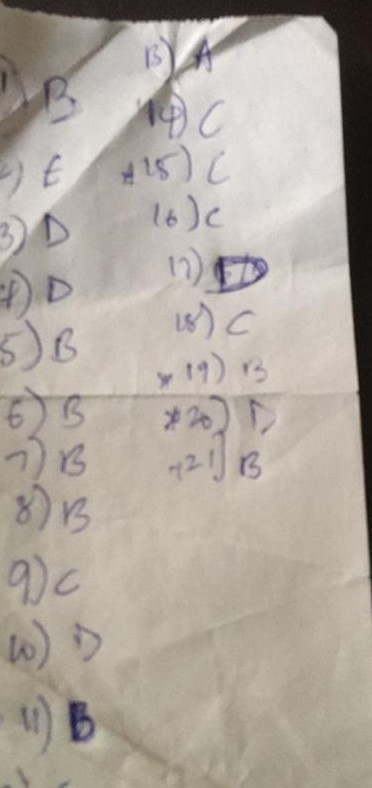
The following are the answers to the NECO Government objective questions for 2024
- B
- E
- D
- D
- B
- B
- B
- B
- C
- D
- B
- E
- A
- C
- C
- C
- D
- C
- B
- D
- B
MORE ANSWERS WILL BE POSTED SHORTLY…
More NECO Government Essay Questions
SECTION A
Answer only two questions form this Section
1. Under what conditions shall a Senator lose his/her seat in the Nigerian Senate?
2. Discuss the strategies you would suggest to ensure the political neutrality of the Civil Service?
3. What conditions were associations expected to fulfill before being registered as political parties in the 1979 elections?
4. Discuss the main duties and obligations of citizens in a country.
SECTION B
Answer only three questions from this Section
5. Outline the reasons for inflated census figures in Nigeria.
6. Examine the evolution of Federalism in Nigeria.
7. Highlight the salient features introduced by the 1989 Constitution. 8. Identify the characteristics of military governments in Nigeria.
9. Examine the factors that necessitated the formation of Organization of Petroleum Exporting Countries (OPEC).
10. What factors contributed to the collapse of the second republic party system in Nigeria?
Theory answers loading…%
Related Links:
Complete WAEC Mathematics Questions and Answers
Complete WAEC Physics Questions And Answers For 2025 (Objectives And Theory)
Complete WAEC Biology Questions And Answers For 2025 | Theory And Objectives
How to Score above 300 in JAMB
2025 JAMB Physics Questions for the Day One | CBT Questions & Answers
2025 WAEC Biology Practical Specimen, Questions and Answers
How to Answer NECO Government Questions
This section the article is for everyone and especially for all those candidates who are desperate to knowing the right thing to do in order to achieve excellent performance in NECO Government examination.
The following are the special tips on how to NECO government:
Read Instructions
Once you have settled to take your examination in the examination hall, the next thing that you must do first is to read through the instructions on top of the page before you can proceed with reading the questions.
Most times, some instructions are specific to some questions, maybe one or two questions. Here, you still have to take those instructions very serious.
Read Carefully
Before you can proceed to answering NECO Government questions, it is highly recommended that you read carefully to understand any question before you can start to answer the questions.
It is possible to see questions that would be similar to what you have been seeing before, probably in past questions, but they are not the same.
This is the point where it is very necessary that you meticulously go through the question before you answer, to avoid choosing the wrong option for objectives and giving wrong explanations for theory questions.
Take Note of Compulsory Questions
In every NECO examination, there is/are usually some questions that are specially made compulsory by the Nation Examination Council. These questions are always seen in the paper 2 which is theory aspect of it.
You must ensure that you are able to answer those compulsory questions before you can think of answering any other ones. The compulsory questions do carry special mark.
Start with the Simplest
Just like any other examinations, the complexity of every question in NECO government examination varies. After you have gone through the questions, you would be able to tell which of the questions are simple and the ones that are difficult.
The best approach in such case requires that you answer the questions from the simplest to the most complex ones. This is important because it will help to cushion you against examination tension.
Not only that, it also helps in the management of your time. If you are finding any question difficult to answer, you have to leave it and go to the next. Thereafter, you can re-visit those questions that you have left unanswered.
5. Attempt all the Question
Though it is advisable that you start answering your question from the simplest, leaving the more difficult ones at the first attempts, it does not imply that you should submit you examination without answering those ones you skipped.
It quite understandable that you may not know all the asked questions, you are still required choose your answers even the ones that you do not really know very well.
Sometime, your guess can fall in place and become the right answer. So always ensure that you attempt all you question before you submit.
6. Review your Answers
After you have attempted the entire given questions, you still have to go through all the answers to check for any errors and possible corrections.
By going through the questions, you would be able to see any skipped question(s), if any and the ones you mistakenly clicked the wrong options.
Get more tips: How to Pass your NECO Examination at One Sitting
Top 5 Reasons for Poor Performance in NECO Government Examination
It is an error to assume that NECO Government examination is hard. Failure to perform excellently in NECO Government examination is a question of whether the candidate knows the right things to do and if he/she is doing it right.
The poor performance that have been seen in some candidates’ results over the years are as a result of poor application of the basic principles for writing NECO Government examination and some other factors that I am going to show you here.
Inadequate Preparation
This is the most important aspect of the reasons for poor performance in NECO Government that should be considered.
It is obtainable in all areas that when there is poor preparation for any examination they will be poor result. As a good student, you are required to prepare for the NECO Government examination to the point that you would be sure of scoring high.
Reading without Past Questions
During the preparation phase of NECO Government examination and any other subjects, it is very pertinent that candidates make use of past question papers with reference to their answers.
Failure to make use past questions and answers is one the reasons why many candidates are left in abeyance immediately they enter the examination halls for the Government examinations.
Due to the ignorance of the nature of the examination, they will not even know to answer and most time it will result to examination tension and probably fever for the students.
Poor Time Management
Time management is another important factor that can lead to poor performance in every examination. You should learn how to manage your time especially when you are in the examination hall.
The practice of time management starts from the period of the candidate’s preparation for the examination. Once you can answer your past questions comfortably with the limited time that will be provided, you will still manage your time very well on the examination date.
Lack of Adherence to Given Instructions
There are some students who are fond of ignoring instructions when come for examination. Jumping into answering of questions without reading the given instructions is very wrong. This contributes in a big way to poor performance in the examination.
If you want to have good performance in NECO Government, you have to strictly pay close attention to any given instructions.
Submitting Incomplete Answers
When a candidate submits the examination without attempting all the questions, it will automatically affect his/her score. It is important you answer all the questions before your submission.
I believe that you have found this article helpful. For any other questions or comments on NECO Government Questions and Answers for 2025 June/July SSCE, kindly make use of the comment section below.
Do not forget to share this article to others.
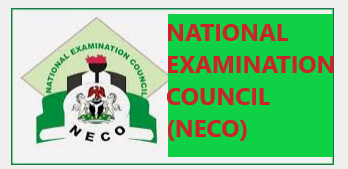
Wow.
I wish to learn more